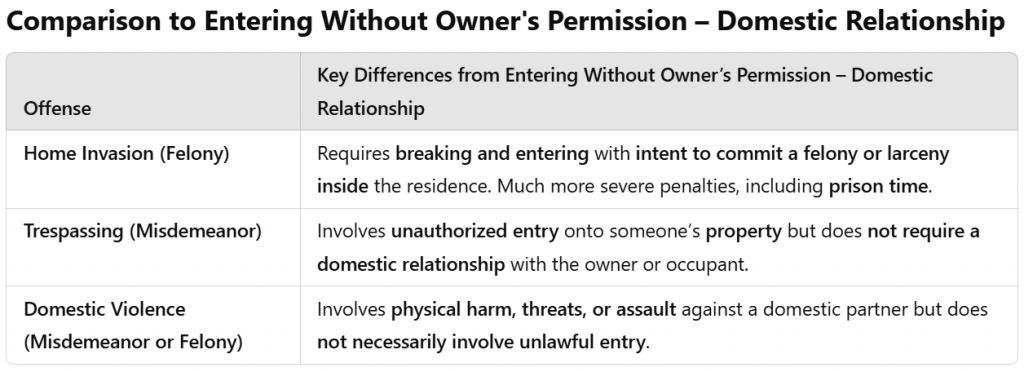Entering Without Owner’s Permission Related to a Domestic Relationship: What You Need to Know
You need help from an experienced lawyer if you are or were in a domestic relationship and face an accusation of going into a home without permission.

Entry Into the Home of a Current or Former Domestic Partner Without the Owner’s Permission
Michigan law criminalizes entering a home owned by a current or former domestic partner without the owner’s permission, even when there is a current or former domestic relationship. This law makes it a misdemeanor to enter or remain in a dwelling without the owner’s or lawful occupant’s permission, even when that owner is a current or former domestic partner.
Many people charged under this law do not realize that a previously lawful entry into a shared residence could later be considered criminal if permission is revoked. This charge carries serious legal and personal consequences. A conviction can lead to jail time, fines, and a criminal record. Understanding the elements of the offense, potential defenses, and the importance of hiring a skilled criminal defense attorney can make a significant difference in the outcome of a case.
What Is Entering Without Owner’s Permission – Domestic Relationship?
MCL 750.115e prohibits a person from entering or remaining in a dwelling without permission when they share or previously shared a domestic relationship with the owner or lawful occupant. The prosecution must prove these elements:
- Unauthorized entry or remaining inside the residence
- A domestic relationship exists or previously existed
A domestic relationship includes:
- Current or former spouses
- Individuals who share a child
- Current or former dating partners
- People who lived together as household members
Misdemeanor vs. Felony Charges for Entering a Home Without Owner’s Permission
Entering Without Owner’s Permission – Domestic Relationship is a misdemeanor. It differs from home invasion, which requires breaking and entering with intent to commit a felony or larceny inside.
A misdemeanor may seem less serious than a felony, but a conviction can still lead to significant long-term consequences. Employers, landlords, and licensing boards frequently check criminal records.
Real-World Examples of This Charge
- A former spouse enters their ex’s home to retrieve personal belongings without permission.
- An ex-boyfriend enters his former girlfriend’s apartment using an old key, believing he still has access.
- Someone who once lived with a roommate reenters the shared home after moving out, against the occupant’s wishes.
In each case, the prosecution could charge the accused under MCL 750.115e.

Penalties for Entering Without Owner’s Permission – Domestic Relationship
You must take the situation seriously if you face allegations of entering a home without the owner’s permission, especially in a case related to a domestic relationship. In these cases, judges often resort to harsh penalties including jail and years of probation. A conviction carries serious consequences, including:
- Up to 93 days in jail
- A fine of up to $500.00
- Years of probation with conditions such as counseling, no-contact orders, or community service
Collateral Consequences of a Conviction for Entering Without Owner’s Permission – Domestic Relationship
Employment Challenges
Employers frequently conduct background checks. A conviction for Entering Without the Owner’s Permission in a domestic relationship can cause job offers to be rescinded. Some industries, including healthcare, law enforcement, and education, may refuse to hire individuals with this conviction.
Professional Licensing Issues
Many careers require professional licenses. A misdemeanor conviction may lead to disciplinary action, suspension, or even revocation of a professional license. Professionals in law, medicine, real estate, and other regulated fields face strict character and fitness evaluations that will be affected by a misdemeanor conviction.
Immigration Consequences
Non-citizens convicted of Entering Without Owner’s Permission in a domestic Relationship could face immigration consequences such as visa denials, deportation, or difficulty obtaining U.S. citizenship. Immigration officials view any criminal conviction as a potential ground for removal.
Family Law and Child Custody Implications
Family courts consider criminal records when determining custody and visitation rights. A conviction can lead to restrictions, including:
- Supervised visitation
- A reduced parenting schedule
- Protective orders preventing contact


Defenses Against Entering Without Owner’s Permission – Domestic Relationship
As with any criminal charge, skilled and experienced defense lawyers build a defense to argue for dismissal, an acquittal, or reduced charges. Some defenses include the following:
Lack of Criminal Intent
Many people accused of Entering Without Owner’s Permission – Domestic Relationship do not realize their actions were illegal. Prosecutors must prove that the accused knew they did not have permission but entered anyway. If someone mistakenly believed they had permission, that could serve as a defense.
Consent from the Property Owner or Occupant
A person cannot be convicted if the owner or lawful occupant gives them permission to enter. Depending on the circumstances, if consent was granted but later revoked, there may still be a viable defense.
Mistaken Identity
If police arrested the wrong person or lacked evidence proving the accused entered unlawfully, the defense could argue mistaken identity. Security footage, alibi witnesses, and phone records often play a role in this defense.

Why Precharge Legal Representation Matters
If you face accusations of criminal activity, acting quickly is crucial to protect yourself. A precharge criminal defense lawyer can take proactive steps to defend you, reduce the risk of charges being filed, and guide you in mitigating potential prosecution.
Preventing Charges Before They Are Filed
Hiring an attorney before the police file charges can make a difference. A precharge defense lawyer can:
- Negotiate with prosecutors to prevent charges or significantly reduce the charges
- Gather evidence to prove innocence
- Ensure the accused does not incriminate themselves during questioning
What to Do If Police Are Investigating You
- Do not talk to law enforcement without an attorney.
- Save all communications with the property owner or occupant.
- Avoid direct contact with the alleged victim.

How LEWIS & DICKSTEIN, P.L.L.C. Can Help if You Face Charges for Entering Without Owner’s Permission – Domestic Relationship
The attorneys at LEWIS & DICKSTEIN, P.L.L.C. have extensive experience defending clients charged with Entering Without Owner’s Permission – Domestic Relationship. Our legal team:
- Aggressively fights to get charges dismissed or reduced
- Provides precharge representation to prevent formal charges
- Uses expert legal strategies to build the strongest possible defense
- Collaborates and communicates with our clients to include them in their own defense
- Provides honest and candid advice to help clients make informed decisions
The right legal defense can make the difference between a conviction and a dismissal. Call today for a free consultation and protect your future.
Call us today at (248) 263-6800 for a free consultation or complete an online Request for Assistance Form. We will contact you promptly and find a way to help you.













